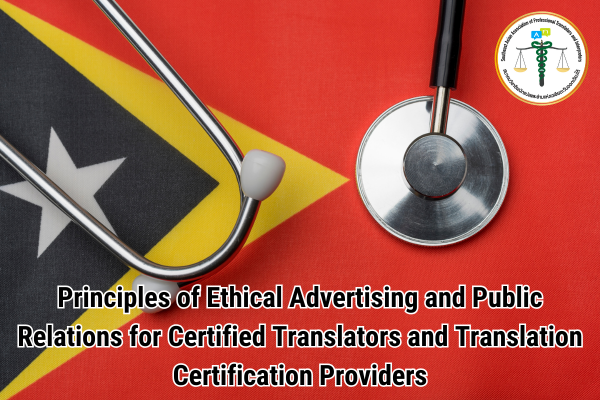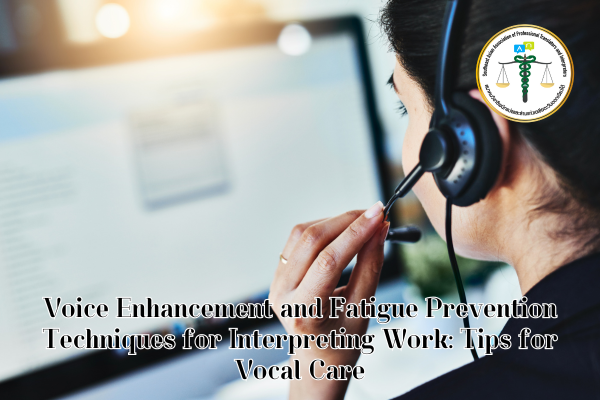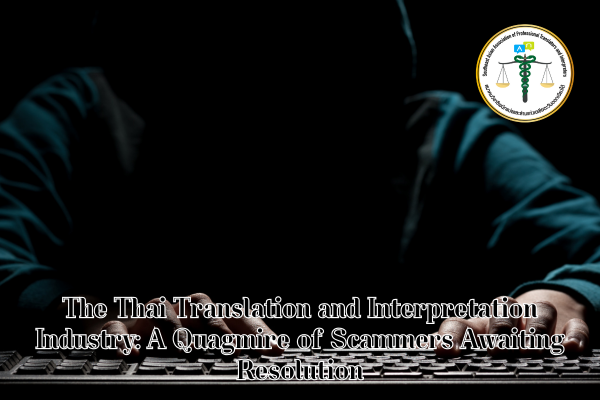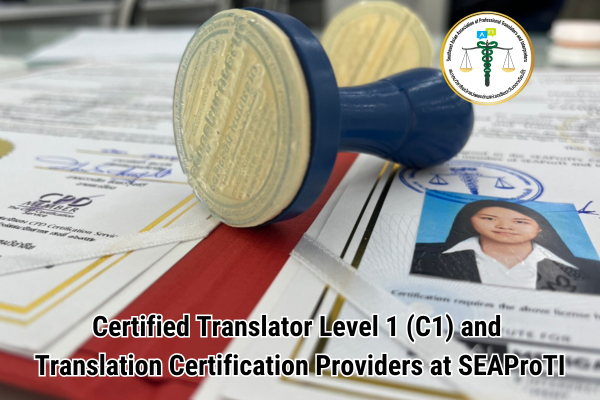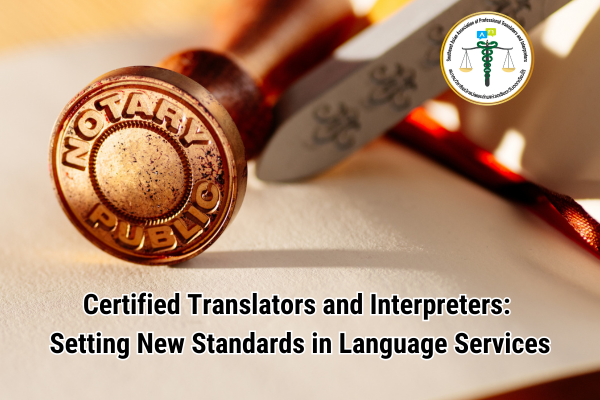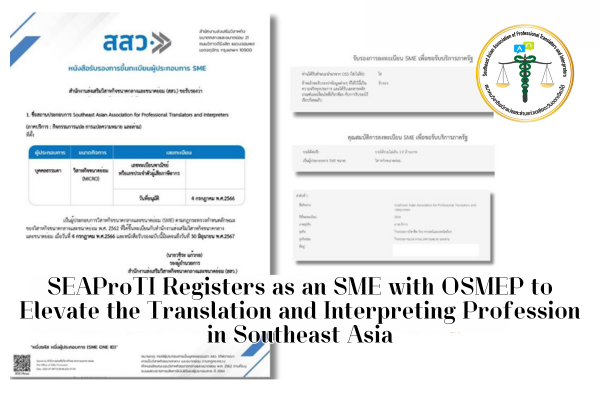Challenges and Solutions for Legal Interpreters in Thailand in 2024
28 December 2024, Bangkok – In 2024, the role of interpreters in the justice system has become increasingly important, especially in Thailand, a hub of linguistic and cultural diversity. Accurate and clear communication in legal proceedings is essential to ensuring equality and justice for all parties involved. However, interpreters in the Thai justice system continue to face challenges that impact their efficiency and quality of work. This article outlines the key challenges faced by interpreters in Thailand’s legal system and presents solutions to improve their standards and professionalism.
Challenge 1: Certification Gaps
Challenge: Thailand lacks a universally recognized certification system for legal interpreters, resulting in inconsistent quality and competency levels. Additionally, the absence of specialized training programs poses a significant barrier, leaving some interpreters ill-prepared for complex or legal-specific scenarios.
Solutions:
-
Develop a Certification System: Establish a certification program tailored for legal interpretation, focusing on areas such as court interpretation, witness testimony translation, and legal document translation. This system should be overseen by professional organizations such as the Southeast Asian Association of Professional Translators and Interpreters (SEAProTI).
-
Mandatory Training: Require all interpreters who wish to work in the legal system to undergo comprehensive training in areas such as legal ethics, courtroom practices, and real-world interpretation techniques.
-
Continuous Professional Development: Implement a system for ongoing learning, such as attending seminars, workshops, and online courses, to ensure interpreters continually enhance their skills.
Challenge 2: Terminological Complexity
Challenge: Legal terminology often consists of specialized terms that lack direct Thai equivalents, making accurate translation challenging. Misinterpretation of such terms can lead to misunderstandings and affect judicial outcomes.
Solutions:
-
Develop Legal Glossaries: Relevant organizations should create comprehensive legal glossaries or databases accessible to interpreters.
-
Specialized Training: Provide interpreters with training on commonly used legal terms, including understanding their context and meaning in various situations.
-
Collaboration: Encourage collaboration among interpreters, legal experts, and linguists to develop accurate translations and appropriate usage of legal terms in the Thai context.
Challenge 3: Emotional and Psychological Strain
Challenge: Interpreters in the justice system often work in high-pressure environments, such as criminal trials involving traumatic evidence or testimonies. These stressful situations can impact interpreters’ performance and mental health.
Solutions:
-
Psychological Support: Provide interpreters with access to counseling and psychological support services, particularly after handling emotionally taxing cases.
-
Resilience Training: Conduct workshops to help interpreters build stress management skills and emotional resilience to perform effectively under challenging conditions.
-
Workload Management: Agencies should create balanced work schedules to prevent burnout from prolonged exposure to high-stress situations.
Challenge 4: Cultural Nuances in Legal Interpretation
Challenge: Thai culture emphasizes politeness and indirect communication, which can conflict with the direct and explicit nature of legal interpretation. Misunderstanding cultural nuances can lead to errors in interpretation.
Solutions:
-
Cultural Sensitivity Training: Train interpreters to navigate cultural differences effectively while maintaining accuracy and neutrality.
-
Building Mutual Understanding: Interpreters should work closely with stakeholders such as lawyers, judges, and prosecutors to align expectations and ensure clear communication.
Challenge 5: Limited Resources and Technology
Challenge: Some interpreters in the justice system lack access to modern tools and technology, such as real-time translation software or high-quality audio equipment. This resource gap hinders their efficiency and accuracy.
Solutions:
-
Invest in Technology: Agencies should invest in tools like real-time translation software and high-quality audio equipment to enhance interpretation efficiency.
-
Technology Training: Provide interpreters with training on using relevant technologies effectively.
-
Budget Support: Government and related organizations should allocate funds to support resource and technology development for interpreters.
How Low-Quality Interpreters in the Justice System Affect Citizens’ Rights
Low-quality interpreters in the justice system can severely impact the rights of individuals in several ways, as outlined below:
1. Right to a Fair Trial
- If interpreters fail to translate accurately or completely, individuals relying on their services may not receive critical information during legal proceedings, such as questions, explanations, or evidence.
- Misinterpretations or distortions can prevent the accused from effectively defending themselves, potentially affecting the outcome of the case.
2. Right to Effective Communication
- Individuals who do not understand the language may be unable to present facts or intentions correctly if the interpreter lacks sufficient skills.
- Miscommunication may lead to delays or errors in the legal process.
3. Violation of Human Rights
- Poor-quality interpreters may result in suspects or defendants not being informed of their rights, such as the right to remain silent or the right to legal representation.
- Inadequate interpretation of charges may lead to unintended guilty pleas by the accused.
4. Inequality in the Justice System
- Individuals reliant on interpreters may face unequal treatment compared to those proficient in the primary language used in legal proceedings.
- A lack of skilled interpreters may lead to discrimination against vulnerable groups, such as minorities, refugees, or those not fluent in Thai.
5. Erosion of Trust in the Justice System
- If the public perceives that interpreters in the justice system are unqualified, it may lead to distrust in the justice system and the perception that it is unfair and unreliable.
Solutions
- Ensuring Interpreter Quality: Strict training and certification processes for interpreters in the justice system should be implemented through recognized organizations, such as SEAProTI.
- Monitoring and Evaluation: Regular quality checks and performance assessments of interpreters are necessary.
- Developing Infrastructure: Allocate resources and adopt technology to support interpreters, such as real-time translation systems.
Having qualified interpreters in the justice system is essential to safeguarding citizens’ rights and maintaining fairness and justice in society.
Conclusion
Improving the quality and standards of interpreters in Thailand’s justice system is essential to ensure smooth and fair judicial proceedings. Addressing these challenges should begin with developing a certification system, comprehensive training programs, managing legal terminology, providing psychological support, and investing in resources and technology. With these measures in place, legal interpreters in Thailand can perform their duties more effectively and contribute to promoting justice and fairness in society.
About SEAProTI’s certified translators, translation certification providers, and certified interpreters:
The Southeast Asian Association of Professional Translators and Interpreters (SEAProTI) has officially announced the criteria and qualifications for individuals to register as “Certified Translators,” “Translation Certification Providers,” and “Certified Interpreters” under the association’s regulations. These guidelines are detailed in Sections 9 and 10 of the Royal Thai Government Gazette, issued by the Secretariat of the Cabinet under the Office of the Prime Minister of the Kingdom of Thailand, dated July 25, 2024, Volume 141, Part 66 Ng, Page 100.
To read the full publication, visit: the Royal Thai Government Gazette
ปัญหาและแนวทางแก้ไขสำหรับล่ามในกระบวนการยุติธรรมไทย ปี 2567
28 ธันวาคม 2567, กรุงเทพมหานคร – ในปี 2567 บทบาทของล่ามในกระบวนการยุติธรรมมีความสำคัญอย่างมาก โดยเฉพาะในประเทศไทยที่เป็นศูนย์กลางของความหลากหลายทางภาษาและวัฒนธรรม การสื่อสารที่ถูกต้องและชัดเจนในกระบวนการยุติธรรมมีความสำคัญอย่างยิ่งในการสร้างความเท่าเทียมและความยุติธรรมให้กับทุกฝ่าย อย่างไรก็ตาม ล่ามในกระบวนการยุติธรรมไทยยังคงเผชิญกับปัญหาและอุปสรรคที่ส่งผลกระทบต่อประสิทธิภาพและคุณภาพของงาน บทความนี้จะกล่าวถึงปัญหาหลักที่ล่ามในกระบวนการยุติธรรมเผชิญ พร้อมทั้งนำเสนอแนวทางแก้ไขเพื่อยกระดับมาตรฐานและคุณภาพของล่ามในประเทศไทย
ปัญหาที่ 1: ช่องว่างในระบบการรับรองมาตรฐาน (Certification Gaps)
ปัญหา: ในประเทศไทย หน่วยงานราชการไทยยังไม่มีระบบการรับรองมาตรฐานล่ามในกระบวนการยุติธรรมที่เป็นที่ยอมรับในระดับสากล ส่งผลให้คุณภาพของล่ามมีความหลากหลายและขาดความสม่ำเสมอ การขาดการฝึกอบรมที่เน้นเฉพาะด้านยังเป็นอุปสรรคที่ทำให้ล่ามบางคนไม่มีความพร้อมในการทำงานในสถานการณ์ที่ซับซ้อนหรือเกี่ยวข้องกับกฎหมาย
แนวทางแก้ไข:
-
พัฒนาระบบการรับรองมาตรฐาน: ควรมีการจัดตั้งระบบการรับรองล่ามที่เน้นการฝึกอบรมเฉพาะด้าน เช่น การแปลในศาล การแปลคำให้การของพยาน และการแปลเอกสารทางกฎหมาย ระบบนี้ควรมีการตรวจสอบคุณภาพและรับรองโดยหน่วยงานมืออาชีพ เช่น สมาคมวิชาชีพนักแปลและล่ามแห่งเอเชียตะวันออกเฉียงใต้ (SEAProTI)
-
การฝึกอบรมบังคับ: ล่ามทุกคนที่ต้องการทำงานในกระบวนการยุติธรรมควรผ่านการฝึกอบรมที่ครอบคลุม เช่น การอบรมด้านจริยธรรมทางกฎหมาย การปฏิบัติในศาล และการใช้เทคนิคการแปลในสถานการณ์จริง
-
การพัฒนาวิชาชีพอย่างต่อเนื่อง: ควรมีระบบการเรียนรู้และการฝึกอบรมเพิ่มเติมเพื่อให้ล่ามมีโอกาสพัฒนาความสามารถอย่างต่อเนื่อง เช่น การเข้าร่วมสัมมนา การฝึกอบรมเชิงปฏิบัติการ และการเรียนรู้ผ่านแพลตฟอร์มออนไลน์
ปัญหาที่ 2: ความซับซ้อนของคำศัพท์ทางกฎหมาย (Terminological Complexity)
ปัญหา: คำศัพท์ทางกฎหมายมักเป็นคำศัพท์เฉพาะที่ไม่มีคำแปลตรงตัวในภาษาไทย ทำให้การแปลหรือการตีความคำศัพท์เหล่านี้เป็นเรื่องที่ท้าทาย การแปลที่ไม่ถูกต้องอาจนำไปสู่ความเข้าใจผิดและผลกระทบต่อกระบวนการยุติธรรม
แนวทางแก้ไข:
-
การจัดทำพจนานุกรมกฎหมาย: หน่วยงานที่เกี่ยวข้องควรจัดทำพจนานุกรมหรือฐานข้อมูลคำศัพท์ทางกฎหมายที่ครอบคลุมและเข้าถึงได้ง่ายสำหรับล่าม
-
การอบรมเฉพาะทาง: ล่ามควรได้รับการฝึกอบรมเกี่ยวกับคำศัพท์ทางกฎหมายที่พบได้บ่อย รวมถึงการทำความเข้าใจกับบริบทและความหมายของคำศัพท์ในสถานการณ์ต่างๆ
-
การทำงานร่วมกัน: ควรมีการร่วมมือระหว่างล่าม นักกฎหมาย และนักภาษาศาสตร์ เพื่อพัฒนาคำแปลและแนวทางการใช้คำศัพท์ที่ถูกต้องและเหมาะสมกับบริบทไทย
ปัญหาที่ 3: แรงกดดันทางอารมณ์และจิตใจ (Emotional and Psychological Strain)
ปัญหา: ล่ามในกระบวนการยุติธรรมมักต้องทำงานในสภาพแวดล้อมที่มีความกดดันสูง เช่น การพิจารณาคดีอาญาที่เกี่ยวข้องกับพยานหลักฐานที่สะเทือนใจหรือการให้การในคดีที่มีผลกระทบรุนแรง ความเครียดและแรงกดดันเหล่านี้สามารถส่งผลกระทบต่อประสิทธิภาพและความถูกต้องของการแปล
แนวทางแก้ไข:
-
การสนับสนุนด้านจิตวิทยา: ควรจัดให้มีบริการคำปรึกษาและการสนับสนุนด้านจิตวิทยาสำหรับล่าม โดยเฉพาะในกรณีที่ต้องเผชิญกับเหตุการณ์ที่สะเทือนใจ
-
การอบรมเสริมสร้างความยืดหยุ่น: ล่ามควรได้รับการอบรมเพื่อพัฒนาทักษะการจัดการความเครียดและเสริมสร้างความยืดหยุ่นทางอารมณ์ เพื่อให้สามารถทำงานได้อย่างมีประสิทธิภาพในสถานการณ์ที่ท้าทาย
-
การบริหารจัดการงาน: หน่วยงานควรจัดตารางการทำงานที่สมดุล เพื่อลดความเหนื่อยล้าจากการทำงานต่อเนื่องในสถานการณ์ที่ตึงเครียด
ปัญหาที่ 4: ความแตกต่างทางวัฒนธรรมในงานแปล (Cultural Nuances in Legal Interpretation)
ปัญหา: ประเทศไทยมีวัฒนธรรมที่ให้ความสำคัญกับความสุภาพและการสื่อสารที่อ้อมค้อม ซึ่งอาจขัดแย้งกับลักษณะของการแปลในกระบวนการยุติธรรมที่ต้องตรงไปตรงมาและชัดเจน ความไม่เข้าใจในบริบททางวัฒนธรรมอาจทำให้การแปลมีข้อผิดพลาด
แนวทางแก้ไข:
-
การฝึกอบรมเรื่องการสื่อสารข้ามวัฒนธรรม: ล่ามควรได้รับการฝึกอบรมเกี่ยวกับความแตกต่างทางวัฒนธรรมและวิธีการจัดการความแตกต่างเหล่านี้ในงานแปล
-
การสร้างความเข้าใจร่วมกัน: ล่ามควรทำงานอย่างใกล้ชิดกับผู้ที่เกี่ยวข้อง เช่น ทนายความ ผู้พิพากษา และพนักงานอัยการ ซึ่งบุคลาการเหล่านี้ไม่ได้เข้าใจการทำงานหรือทำหน้าที่ของล่าม เพื่อสร้างความเข้าใจในบริบทและข้อกำหนดของกระบวนการยุติธรรม
ปัญหาที่ 5: การขาดแคลนทรัพยากรและเทคโนโลยี (Limited Resources and Technology)
ปัญหา: ล่ามในกระบวนการยุติธรรมบางคนยังขาดเครื่องมือและเทคโนโลยีที่ทันสมัย เช่น ซอฟต์แวร์แปลภาษาแบบเรียลไทม์หรืออุปกรณ์เสียงที่มีคุณภาพ การขาดแคลนทรัพยากรเหล่านี้ส่งผลต่อประสิทธิภาพการทำงานและความแม่นยำของการแปล
แนวทางแก้ไข:
-
การลงทุนในเทคโนโลยี: หน่วยงานที่เกี่ยวข้องควรลงทุนในเทคโนโลยีที่ช่วยเพิ่มประสิทธิภาพในการแปล เช่น เครื่องมือแปลภาษาแบบเรียลไทม์และอุปกรณ์เสียงที่มีคุณภาพสูง
-
การฝึกอบรมการใช้เทคโนโลยี: ล่ามควรได้รับการฝึกอบรมเกี่ยวกับการใช้เทคโนโลยีที่เกี่ยวข้อง เพื่อให้สามารถใช้งานได้อย่างมีประสิทธิภาพ
-
การสนับสนุนด้านงบประมาณ: รัฐบาลและหน่วยงานที่เกี่ยวข้องควรจัดสรรงบประมาณเพื่อสนับสนุนการพัฒนาทรัพยากรและเทคโนโลยีสำหรับล่าม
ล่ามในกระบวนการยุติธรรมที่ไม่มีคุณภาพสามารถส่งผลกระทบต่อสิทธิของประชาชนอย่างร้ายแรงในหลายด้าน ดังนี้:
1. สิทธิในการพิจารณาคดีที่เป็นธรรม (Right to a Fair Trial)
- หากล่ามแปลความหมายไม่ถูกต้อง หรือไม่ครบถ้วน ผู้ที่ต้องการใช้บริการล่ามอาจไม่ได้รับข้อมูลที่สำคัญในกระบวนการพิจารณาคดี เช่น คำถาม คำชี้แจง หรือพยานหลักฐาน
- การแปลผิดหรือบิดเบือนอาจทำให้ผู้ถูกกล่าวหาเสียโอกาสในการปกป้องตนเอง ส่งผลต่อผลลัพธ์ของคดี
2. การสื่อสารในกระบวนการยุติธรรม (Right to Effective Communication)
- ผู้ที่ไม่เข้าใจภาษาอาจไม่สามารถแสดงข้อเท็จจริง หรือเจตนาของตนได้อย่างถูกต้อง หากล่ามไม่มีทักษะที่เพียงพอ
- การสื่อสารที่คลาดเคลื่อนอาจส่งผลให้กระบวนการพิจารณาคดีเกิดความล่าช้าหรือผิดพลาด
3. การละเมิดสิทธิมนุษยชน (Violation of Human Rights)
- ล่ามที่ไม่มีคุณภาพอาจทำให้ผู้ต้องสงสัยหรือผู้ต้องหาไม่ได้รับข้อมูลเกี่ยวกับสิทธิของตนเอง เช่น สิทธิในการปฏิเสธให้การ หรือสิทธิในการขอทนายความ
- หากไม่มีการแปลที่ชัดเจนเกี่ยวกับข้อกล่าวหา อาจทำให้ผู้ถูกกล่าวหายอมรับผิดโดยไม่ได้ตั้งใจ
4. ความเหลื่อมล้ำในกระบวนการยุติธรรม
- ผู้ที่ต้องพึ่งพาล่ามมีโอกาสที่จะถูกปฏิบัติอย่างไม่เท่าเทียมเมื่อเทียบกับผู้ที่สามารถใช้ภาษาหลักในกระบวนการได้
- การขาดล่ามที่มีความเชี่ยวชาญอาจทำให้กลุ่มคนที่มีความเปราะบาง เช่น ชนกลุ่มน้อย ผู้ลี้ภัย หรือผู้ที่ไม่สามารถใช้ภาษาไทยได้อย่างคล่องแคล่ว ถูกเลือกปฏิบัติ
5. ผลกระทบต่อความเชื่อมั่นในกระบวนการยุติธรรม
- หากประชาชนมองว่าล่ามในกระบวนการยุติธรรมไม่มีคุณภาพ อาจทำให้เกิดความไม่ไว้วางใจในระบบยุติธรรม และมองว่าระบบไม่ยุติธรรมและไม่น่าเชื่อถือ
แนวทางแก้ไข
- การรับรองคุณภาพของล่าม: ต้องมีการฝึกอบรมและรับรองล่ามในกระบวนการยุติธรรมอย่างเข้มงวดโดยองค์กรที่ได้รับการยอมรับ เช่น SEAProTI
- การควบคุมและประเมินผล: มีการตรวจสอบคุณภาพของการแปลอย่างสม่ำเสมอ รวมถึงการประเมินผลงานของล่าม
- การพัฒนาโครงสร้างพื้นฐาน: จัดสรรทรัพยากรและเทคโนโลยีที่ช่วยเสริมการทำงานของล่าม เช่น ระบบแปลภาษาแบบเรียลไทม์
การมีล่ามที่มีคุณภาพในกระบวนการยุติธรรมจึงถือเป็นสิ่งจำเป็นเพื่อปกป้องสิทธิของประชาชนและรักษาความยุติธรรมในสังคม
สรุป
การพัฒนาคุณภาพและมาตรฐานของล่ามในกระบวนการยุติธรรมไทยเป็นสิ่งจำเป็นเพื่อให้การดำเนินกระบวนการยุติธรรมเป็นไปอย่างราบรื่นและเป็นธรรม การแก้ไขปัญหาดังกล่าวควรเริ่มต้นจากการพัฒนาระบบการรับรองมาตรฐาน การฝึกอบรมที่ครอบคลุม การจัดการคำศัพท์ทางกฎหมาย การสนับสนุนด้านจิตวิทยา และการลงทุนในทรัพยากรและเทคโนโลยี ด้วยแนวทางเหล่านี้ ล่ามในกระบวนการยุติธรรมไทยจะสามารถทำงานได้อย่างมีประสิทธิภาพและช่วยสนับสนุนความยุติธรรมในสังคมได้อย่างแท้จริง
เกี่ยวกับนักแปลรับรอง ผู้รับรองการแปล และล่ามรับรองของสมาคมวิชาชีพนักแปลและล่ามแห่งเอเชียตะวันออกเฉียงใต้
สมาคมวิชาชีพนักแปลและล่ามแห่งเอเชียตะวันออกเฉียงใต้ (SEAProTI) ได้ประกาศหลักเกณฑ์และคุณสมบัติผู้ที่ขึ้นทะเบียนเป็น “นักแปลรับรอง (Certified Translators) และผู้รับรองการแปล (Translation Certification Providers) และล่ามรับรอง (Certified Interpreters)” ของสมาคม หมวดที่ 9 และหมวดที่ 10 ในราชกิจจานุเบกษา ของสำนักเลขาธิการคณะรัฐมนตรี ในสำนักนายกรัฐมนตรี แห่งราชอาณาจักรไทย ลงวันที่ 25 ก.ค. 2567 เล่มที่ 141 ตอนที่ 66 ง หน้า 100 อ่านฉบับเต็มได้ที่: นักแปลรับรอง ผู้รับรองการแปล และล่ามรับรอง



